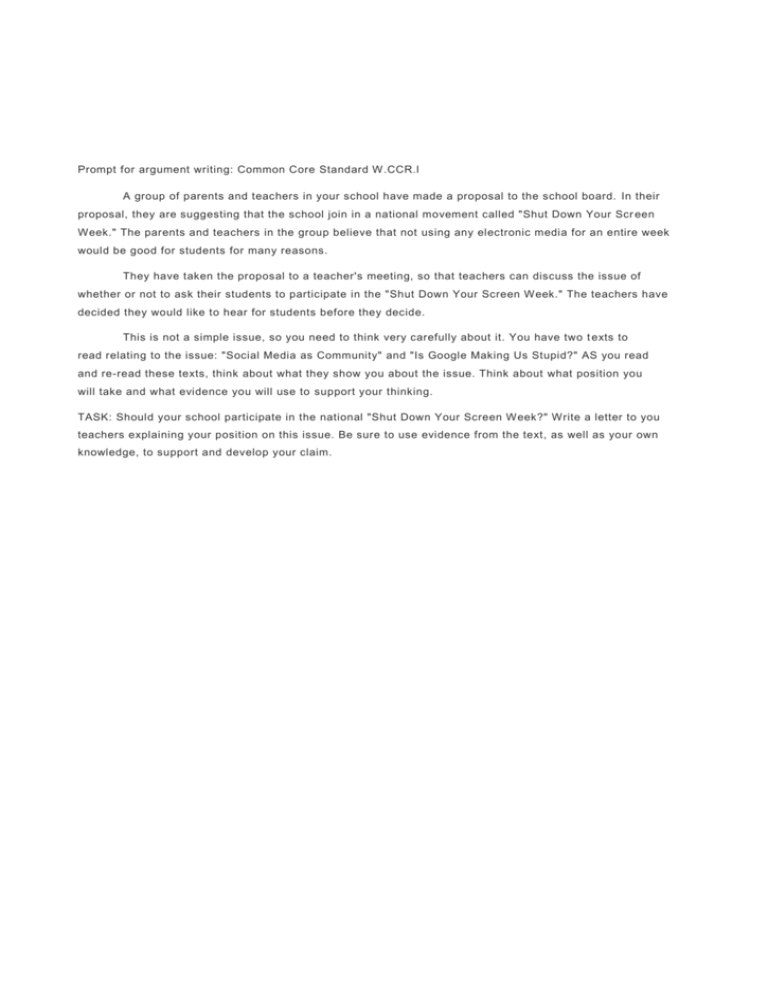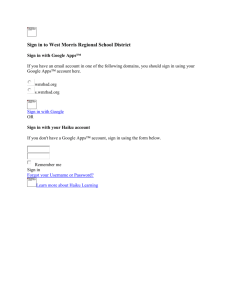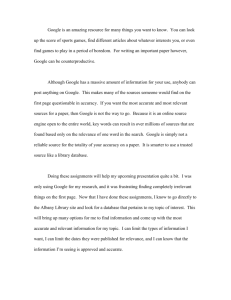Prompt for argument writing: Common Core Standard W.CCR.l A
advertisement

Prompt for argument writing: Common Core Standard W.CCR.l A group of parents and teachers in your school have made a proposal to the school board. In their proposal, they are suggesting that the school join in a national movement called "Shut Down Your Scr een Week." The parents and teachers in the group believe that not using any electronic media for an entire week would be good for students for many reasons. They have taken the proposal to a teacher's meeting, so that teachers can discuss the issue of whether or not to ask their students to participate in the "Shut Down Your Screen Week." The teachers have decided they would like to hear for students before they decide. This is not a simple issue, so you need to think very carefully about it. You have two t exts to read relating to the issue: "Social Media as Community" and "Is Google Making Us Stupid?" AS you read and re-read these texts, think about what they show you about the issue. Think about what position you will take and what evidence you will use to support your thinking. TASK: Should your school participate in the national "Shut Down Your Screen Week?" Write a letter to you teachers explaining your position on this issue. Be sure to use evidence from the text, as well as your own knowledge, to support and develop your claim. 78 Social Media as Community By Keith Hampton Keith Hampton is an associate professor in the School of Communication and Information at Rutgers, and a past chairman of the American Sociological Association's section on Communicatio n and Information Technologies. Updated June 18, 2012 New York Times/Opinion Pages Excerpt Neither living alone nor using social media is socially isolating. In 2011,1 was lead author of an article in Information, Communication & Society that found, based on a representative survey of 2,500 Americans, that regardless of whether the participants were married or single, those who used social media had more close confidants. The constant feed from our online social circles is the modern front porch. A recent follow-up study, "Social Networking Sites and Our Lives " (Pew Research Center), found that the average user of a social networking site had more close ties than and was half as likely to be socially isolated as the average American. Additionally, my co -authors and I, in another article published in New Media & Society, found not only that social media users knew people from a greater variety of backgrounds, but also that much of this diversity was a result of people using these technologies who simultaneousl y spent an impressive amount of time socializing outside of the house. A number of studies, including my own and those of Matthew Brashears (a sociologist at Cornell), have found that Americans have fewer intimate relationships today than 20 years ago. How ever, a loss of close friends does not mean a loss of support. Because of cellphones and social media, those we depend on are more accessible today than at any point since we lived in small, village -like settlements. Social media has made every relationshi p persistent and pervasive. We no longer lose social ties over our lives; we have Facebook friends forever. The constant feed of status updates and digital photos from our online social circles is the modern front porch. This is why, in "Social Networking Sites and Our Lives," there was a clear trend for those who used these technologies to receive more social support than other people. The data backs it up. There is little evidence that social media is responsible for a trend of isolation, or a loss of intimacy and social support. 80 Is Google Making Us Stupid? YES Who doesn't love Google? In the blink of an eye, the search engine delivers useful information about pretty much any subject imaginable. I use it all the time, and I'm guessing you do too. But I worry about what Google is doing to our brains. What really makes us intelligent isn't our ability to find lots of information quickly. It's our ability to think deeply about that information. And deep thinking, brain scientists have discovered, happens only when our minds are calm and attentive. The greater our concentration, the richer our thoughts. If we're distracted, we understand less, remember less, and learn less. That's the problem with Google—and with the Internet In general. When we use our computer s and our cellphones all the time, we're always distracted. The Net bombards us with messages and other bits of data, and every one of those interruptions breaks our train of thought. We end up scatterbrained. The fact is, you'll never think deeply if you' re always Googling, texting, and surfing. Google doesn't want us to slow down. The faster we zip across the Web, clicking links and skimming words and pictures, the more ads Google is able to show us and the more money it makes. So even as Google is giving us all that useful information, it's also encouraging us to think superficially. It's making us shallow. If you're really interested in developing your mind, you should turn off your computer and your cellphone — and start thinking. Really thinking. You can Google all the facts you want, but you'll never Google your way to brilliance. Nicholas Carr, Author The Shallows: What the Internet Is Doing to Our Brains NO Any new information technology has both advocates and critics. More than 2,000 years ago, the classical Greek philosopher Socrates complained that the new technology of writing "will create forgetfulness in the learners' souls because they will not use their memories." Today, Google is the new technology. The Internet contains the world's best writing, images, and ideas; Google lets us find the relevant pieces instantly. Suppose I'm interested in the guidance computers on Apollo spacecraft in the 1960s. My local library has no books on that specific subject—just 18 books about the Apollo missions in g eneral. I could 81 hunt through those or turn to Google, which returns 45,000 pages, including a definitive encyclopedia article and instructions for building a unit. Just as a car allows us to move faster and a telescope lets us see farther, access to the In ternet's information lets us think better and faster. By considering a wide range of information, we can arrive at more creative and informed solutions. Internet users are more likely to be exposed to a diversity of ideas. In politics, for example, they ar e likely to see ideas from left and right, and see how news is reported in other countries. There's no doubt the Internet can create distractions. But 81 percent of experts polled by the Pew Internet Research Project say the opportunities outweigh the dist ractions. Socrates was wrong to fear the coming of the written word: Writing has improved our law, science, arts, culture, and our memory. When the history of our current age is written, it will say that Google has made us smarter—both individually and collectively—because we have ready and free access to information. Peter Norvig, Director of Research Google Inc. Used by permission of (The New York Times Upfront, Vol. 143, October 4, 2010)




